10 Most Memorable Steve Jobs CEO Moments
The world lost a remarkable visionary and innovator with the passing of Steve Jobs. It is only fitting to take a look back at some of the most memorable moments of this man who is sure to be remembered for decades to come as one who changed everything. From the first Apple computer to Antennagate and everything in between, here are the 10 most memorable Jobs moments.
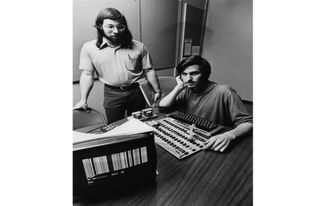
Steve Jobs and Steve Wozniak Build the First Apple Computer (1975)
Apple's beginnings are as humble as they get. Steve Jobs and Steve Wozniak started the company by building the first Apple Computer, the Apple I, in Jobs' parents' garage in 1975 with seed money raised through the sale of Jobs' VW minibus. The following year, the two men founded Apple Computers, Inc, and in 1977 they released the world's first mass market personal computer, the Apple II.
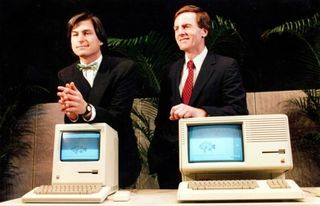
Jobs Ousted by John Sculley (1985)
In 1983, Jobs famously recruited then-Pepsi president John Sculley by asking him if he wanted to "spend the rest of your life selling sugared water, or do you want a chance to change the world?" Two years later, in 1985, amidst poor sales, Apple's Board of Directors and Sculley ousted Jobs from his position as CEO of Apple.
With the $150 million he received for leaving the company, Jobs went on to found NeXT Computer. That company wasn't successful on the hardware front, but its software was innovative, and in 1996 Apple bought NeXT for more than $400 million. Jobs first rejoined Apple as a consultant, but quickly became interim CEO.
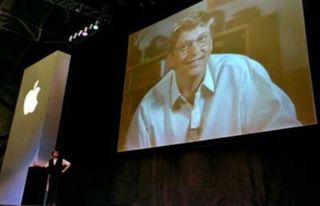
Jobs Allies with Microsoft and Bill Gates
With Microsoft dominating the desktop computer market, Jobs allied himself with his biggest rival and brought MS Office to Mac OS at MacWorld Boston in 1997. The announcement was met with a mixture of cheers and boos from the audience. Gates himself, who appeared via satellite in an image that made him look as though he was a conquering invader, also received a round of jeers.
In 2007, the two tech giants met face-to-face infront of a studio audience. It was then that Jobs said of Gates, "Bill's goal isn't to be the richest guy in the cemetary. ... I look at us as two of the luckiest guys on the planet... we've found what we loved to do at the right place at the right time. Your family and that, what more can you ask for?"
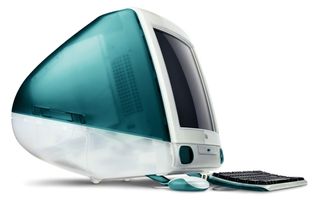
The iMac is Born (1998)
Jobs made his first big product announcement following his return as Apple's CEO when he released the iMac in 1998. The stylish all-in-one computer was marketed as an Internet-ready machine and was the first to forgo the inclusion of a floppy disk drive and instead offered only a CD-ROM drive.
Stay in the know with Laptop Mag
Get our in-depth reviews, helpful tips, great deals, and the biggest news stories delivered to your inbox.
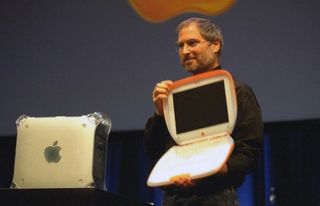
Welcome the iBook (1999)
After launching the business-friendly PowerBook while Jobs was away from the company, Apple introduced the iBook, a consumer laptop. It included Wi-Fi technology and was available in two distinct colors, tangerine and blueberry. Jobs had a direct say in much of its design.
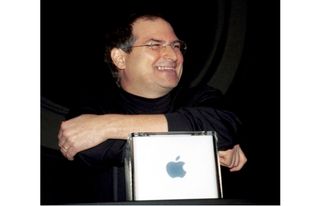
The G4 Cube (2000)
In 2000, Jobs went on stage at the MacWorld Expo and touted the power of Apple's then new G4 Cube, a small form factor desktop.
At the time Jobs said, "The G4 Cube is simply the coolest computer ever. An entirely new class of computer, it marries the Pentium-crushing performance of the Power Mac G4 with the miniaturization, silent operation and elegant desktop design of the iMac."
Commercially, however, the Cube was a flop due to its high cost and issues with case cracking.The Cube would be phased out the next year.
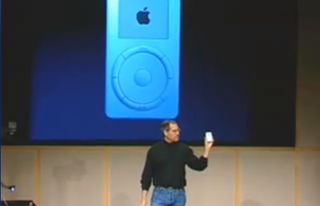
Apple Rocks the Music Industry (2001)
Perhaps the biggest success for Jobs since his return to Apple, the iPod and iTunes were introduced in 2001. The move launched what is today the preeminent online music store and helped Apple single-handedly dominate the MP3 player market for years.
In a 2003 Fortune article interview, Jobs was quoted as saying of iTunes "It will go down in history as a turning point for the music industry. This is landmark stuff. I can't overestimate it."
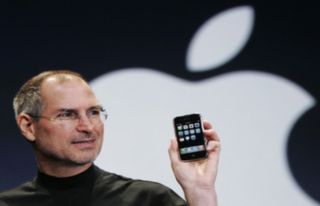
The iPhone Bows (2007)
What the iPod did for the music industry, the iPhone did for the phone industry. Debuted by Jobs at the 2007 Macworld Conference, the iPhone helped transform smartphones from email machines into the multitouch-capable, full web surfing, app-running devices they are today.
The yearly introduction of new iPhones is now a much-hyped occasion that draws speculation and rumors for months prior to their release.
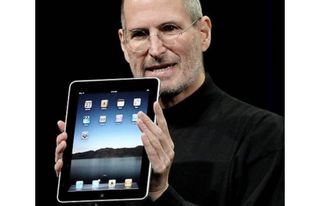
The iPad (2010)
At a time when netbooks were all the rage--remember those?--Steve Jobs introduced "a new category of device" designed to fill the void between the traditional laptop and the smart phone. Apple sold 15 million units in 2010 and is predicted to move 44 million iPads this year.
Understandably, rivals have been banging their heads against the wall in an attempt to come up with ways to match the device's capabilities and ease of use.
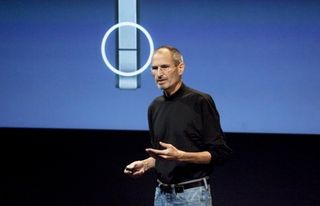
iPhone 4 Antennagate (2010)
The iPhone 4 broke sales records when it debuted in June of 2010, selling 1.7 million devices in just three days. But a highly publicized design flaw started to steal the spotlight soon thereafter.
When users gripped the side of the phone and placed their fingers on its antenna, they immediately saw a significant drop in reception. The issue blew up in Apple's face following an e-mail Jobs sent to an iPhone 4 user who questioned the smartphone's problem, with a curt, “Just avoid holding it in that way."
Although Steve Jobs stressed that other smartphones suffered from a similar "death grip" issue during a press conference in mid-July, the company agreed to provide users with free protective cases that would prevent owners from touching the antenna.
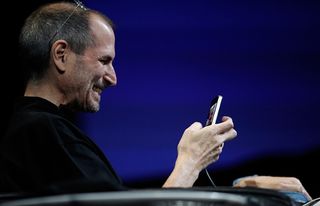
Bonus: Jobs Schools Student on Apple's Priorities
Steve Jobs has a storied history of replying to certain e-mails sent to him at his sjobs@apple.com address. In one famous incident, a 22-year-old Long Island University Journalism student contacted Jobs after several unsuccessful attempts at reaching Apple's public relations personnel for a homework assignment.
In the e-mail, student Chelsea Kate Isaacs questioned why Apple wouldn't help her when her grade depended on it. Jobs replied, saying, "Out goals do not include helping you get a good grade. Sorry." He later followed up with "Please leave us alone."
